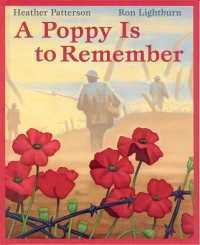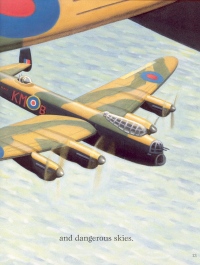| ________________
CM . . .
. Volume XI Number 6 . . . .November 12, 2004
excerpt: The poppy is the symbol of remembrance of war. It is the contradictory symbol of the peaceful flower-filled fields of Flanders where the dead lay buried under the ground where war was waged. Its colour is also a reminder of the blood that was spilled in those battles. A Poppy is to Remember joins the ranks of many other books that have been written in recent years to remind the young that previous generations sacrificed their lives for our freedom. The text is a quiet homage to all those who serve in the military, those who died and those who survived. It extends this respect to civilians who contributed in many different ways as well. Ron Lightburn has masterfully interpreted the text through his paintings. The many, many unknown soldiers from World War I are presented with indistinct features. Each could be someone who lived just around the corner. The colours and styles of the World War II era are accurately depicted. Throughout the book, the red of the poppy brightly stand out as a beacon of the past. What is missing from this book, as well as many other books about the serious issue of war remembrance, is the discussion of whether or not the war justified the sacrifice of our youth. A large part of the 2004 American presidential debate has centered on whether or not Democratic candidate John Kerry was really a hero in Vietnam. The Republicans have taken out attack ads claiming he was not really brave and did not deserve to be awarded The Purple Heart. The Democrats spent their entire convention broadcasting his military record and strong support for the military. Nowhere does the issue come up of why the U.S. intervened in Vietnam.
Similarly, Canada has sent their youth to fight where the sacrifice has not been warranted. World War I, as a most glaring example, had nothing to do with fighting for freedom. It was a war between imperial powers, for control of colonies, notably the ones in Africa. It was of no benefit for men on either side to give their lives for "their country," even though the psychology of the time caused people to identify with one colonial power or another. Many signed up for adventure or out of fear of being branded as a coward. But the distinctions between wars for freedom and wars of aggression have been blurred just because of the physical dangers created by warfare. There is no condemnation of governments who martial the resources of the country and a generation of youth to be wasted in battle. The movement in the U.S. to oppose the invasion of Iraq has been attacked under the guise that they must "support the troops" now that they are there. The phrase is meaningless at best; in reality it means tacit support. Should they be there, and if they are there, should they leave? While we are unable to get into huge political lessons with children about the issues surrounding each specific war, they are capable of understanding more than we think. Teaching children to be against war should not make them unaware. We should remember that children who are caught up in wars know who is firing the rockets and form opinions based on their experiences. To prevent war we have to know who wants to wage it and why. Only then can we act, hopefully using the peaceful institutions our society built out of the rubble of previous wars. That should be the lesson of the poppy and of Remembrance Day. A Poppy is to Remember can form part of this education for young children. Highly Recommended Harriet Zaidman is a teacher-librarian in Winnipeg, MB.
To comment
on this title or this review, send mail to cm@umanitoba.ca.
Copyright © the Manitoba Library Association. Reproduction for personal
use is permitted only if this copyright notice is maintained. Any
other reproduction is prohibited without permission.
NEXT REVIEW |
TABLE OF CONTENTS FOR THIS ISSUE
- November 12, 2004.
AUTHORS |
TITLES |
MEDIA REVIEWS |
PROFILES |
BACK ISSUES |
SEARCH |
CMARCHIVE |
HOME |

 History has concluded that the war in Vietnam was fought to defend and extend the influence of American (mainly) political and economic influence in the world. "Freedom" was a buzzword that had little meaning as the U.S. military carried bombing and napalming actions that killed seven million Vietnamese and ruined the countryside. The people of Laos and Cambodia were bombed while the State Department denied it. Finally, the U.S. had to admit that the people of
Vietnam would not embrace them and left the country in defeat. But in the discussion of Kerry's record and fitness to lead the military as president, American soldiers who fought the "enemy" are hailed for their bravery. There is no sense of regret or contrition for launching an unjust war.
History has concluded that the war in Vietnam was fought to defend and extend the influence of American (mainly) political and economic influence in the world. "Freedom" was a buzzword that had little meaning as the U.S. military carried bombing and napalming actions that killed seven million Vietnamese and ruined the countryside. The people of Laos and Cambodia were bombed while the State Department denied it. Finally, the U.S. had to admit that the people of
Vietnam would not embrace them and left the country in defeat. But in the discussion of Kerry's record and fitness to lead the military as president, American soldiers who fought the "enemy" are hailed for their bravery. There is no sense of regret or contrition for launching an unjust war.